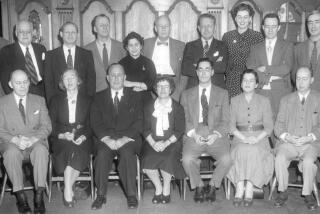The CIA and ‘America’s Great Game’ in the Middle East
- Share via
In the 19th century, the British had a phrase to describe their effort to keep Russia from extending its imperial influence through Central Asia and into the crown jewel of the British empire, India.
It was called the Great Game, with both sides spying, gathering intelligence and manipulating local leaders and populations to their advantage. Rudyard Kipling used the term in his classic 1901 novel “Kim.”
In his new book, “America’s Great Game: The CIA’s Secret Arabists and the Shaping of the Modern Middle East,” Cal State Long Beach history professor Hugh Wilford explains how the same phrase, and many of the same risky tactics, came to describe the post-World War II effort by U.S. operatives to shape the modern Middle East.
Wilford has written about the CIA before and is neither intimidated nor awed by it. He is clearly fascinated by the colorful characters who gravitated to the CIA for a sense of adventure — such as the Roosevelt cousins Kim and Archie, part of the famed American family that has included two presidents.
Kermit Roosevelt Jr., a grandson of Theodore Roosevelt, preferred to be called Kim after the Kipling novel about the daring boy who played the Great Game. Archibald B. Roosevelt Jr., another TR grandson, once was described by his wife as having a career in which “riots and revolutions seemed to follow him. He flew in dangerous airplanes held together by luck and by God.”
As Wilford describes them, the Roosevelts and others, particularly an Alabama maverick named Miles Copeland Jr., were passionate Arabists who wanted the region to move away from the colonial control of Britain and France and toward democracy and free markets. They respected the Arabs and admired their culture.
Early on, the CIA decided that regime-changing coups were necessary: in Syria in 1949 and Iran in 1953. It was also essential to find a Western-friendly Arab leader; the Arabists thought they’d found him in Egypt’s Gamal Abdel Nasser. But Nasser proved to be good at the game and knew how to play one American off another. In its disappointment, the CIA considered assassination plots.
There are cross-currents and intrigues aplenty in “America’s Great Game”: British spies versus American spies, rivalry between the State Department and the CIA, career conflicts between various American officials and the role of U.S. advertising executives: “Mad Men” in the Middle East.
A clean writer and top-notch researcher, Wilford tells his tale briskly. He is also honest with his readers. Getting to absolute truth — determining, say, who orchestrated the Iranian coup that brought the shah to the throne — is often not possible. In retirement, CIA officers told competing stories. The agency’s records remain locked away.
Part of the book deals with the CIA’s early efforts to sway American public support away from the new nation of Israel. Too much support would undercut relationships with Arab and Persian leaders, the Arabists believed.
President Harry S. Truman supported the creation of Israel, but Dwight D. Eisenhower was more distant and aloof. The CIA sensed an opening and funded a front group with the intention of persuading the American public, through media coverage, to keep Israel at arm’s length.
It all added up to nothing, or worse. The Cold War came to dominate U.S. strategic thinking. Eisenhower announced a regional doctrine for the Middle East that emphasized stability above democracy, and beginning with Lyndon B. Johnson, U.S. presidents have been strongly pro-Israel.
By the late 1950s, Wilford wrote, “Everywhere one looked in the Arab world, nationalists were routing pro-Western conservatives.”
In Iraq, the CIA may have been linked to a 1959 assassination plot on new leader Abd al-Karim Qasim involving “a young Ba-athist assassin by the name of Saddam Hussein.” Later, Iran saw the 1979 overthrow of the shah and the rise of angry anti-American, anti-Israel clerics.
Wilford quotes Yale scholar Abbas Amanat: “The thread of memory led clearly from the Great Game to the Great Satan.”
No book about Western attempts to shape the Middle East is complete without a reference to the legend of Lawrence of Arabia. Wilford suggests that Kim Roosevelt, in boasting to U.S. officials about the 1953 Iranian coup, was acting like T.E. Lawrence did in his self-mythologizing memoir “Seven Pillars of Wisdom.”
“There was something of this circular, literary quality to Kim Roosevelt’s involvement in the Iran coup,” Wilford writes.
Roosevelt and other CIA operatives would have done better, Wilford says, to remember a line from “Kim,” spoken by the boy-spy’s mentor: “Thou hast loosed an Act upon the world, and as a stone thrown into a pool so spread the consequences thou canst not tell how far.”
America’s Great Game
The CIA’s Secret Arabists and the Shaping of the Modern Middle East
Hugh Wilford
Basic Books: 384 pp., $29.99
More to Read
Sign up for our Book Club newsletter
Get the latest news, events and more from the Los Angeles Times Book Club, and help us get L.A. reading and talking.
You may occasionally receive promotional content from the Los Angeles Times.










